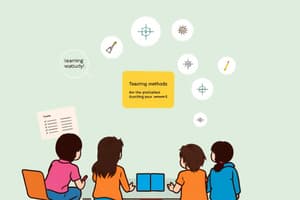Podcast
Questions and Answers
Which education philosophy emphasizes traditional subjects like mathematics and science?
Which education philosophy emphasizes traditional subjects like mathematics and science?
- Progressivism
- Constructivism
- Essentialism (correct)
- Reconstructivism
What is the primary focus of progressivism in education?
What is the primary focus of progressivism in education?
- Experiential learning and critical thinking (correct)
- Enduring ideas and universal truths
- Teacher-centered instruction
- Core academic knowledge
Which educational philosophy aims to address social issues and promote social justice?
Which educational philosophy aims to address social issues and promote social justice?
- Reconstructivism (correct)
- Essentialism
- Constructivism
- Perennialism
What role does the teacher primarily hold in perennialism?
What role does the teacher primarily hold in perennialism?
What aspect does constructivism emphasize in the learning process?
What aspect does constructivism emphasize in the learning process?
Which philosopher is associated with the idea of experiential learning?
Which philosopher is associated with the idea of experiential learning?
What does the role of the teacher vary according to in educational philosophy?
What does the role of the teacher vary according to in educational philosophy?
Which educational philosophy suggests education should focus on classical texts?
Which educational philosophy suggests education should focus on classical texts?
Study Notes
Overview of Education Philosophy
- Education philosophy examines the fundamental nature and aims of education.
- It includes various perspectives on teaching, learning, and the role of educators.
Major Philosophies in Education
-
Essentialism
- Focuses on core knowledge and skills.
- Emphasizes traditional subjects like mathematics, science, and literature.
- Teacher-centered approach.
-
Progressivism
- Emphasizes experiential learning and critical thinking.
- Focuses on the interests and needs of students.
- Advocates for a student-centered approach, often using project-based learning.
-
Perennialism
- Suggests education should focus on enduring ideas and universal truths.
- Importance of classical texts and philosophical discussions.
- Teacher-centered with a focus on intellectual growth.
-
Reconstructivism
- Aims to address social issues and promote social justice through education.
- Encourages critical analysis of societal structures.
- Student-centered, fostering a more active role in the community.
-
Constructivism
- Knowledge is built through experiences and interactions.
- Learning is viewed as an active process where students construct their own understanding.
- Emphasizes collaboration and real-world problem-solving.
Key Concepts in Education Philosophy
-
Aims of Education
- Personal development, social responsibility, citizenship, and vocational training.
-
Role of the Teacher
- Varies from facilitator and guide in student-centered models to authoritative figure in teacher-centered models.
-
Curriculum Development
- Influenced by philosophical beliefs; can be content-driven, skill-driven, or experience-driven.
-
Assessment Methods
- Aligns with educational philosophy; could include standardized tests, portfolios, peer assessments, or self-reflections.
Influential Philosophers in Education
- John Dewey: Advocated for experiential learning and democracy in education.
- Paulo Freire: Emphasized critical pedagogy and the role of education in social change.
- Jean Piaget: Focused on cognitive development and the importance of active learning.
Relevance of Education Philosophy
- Guides educational practices, curriculum choices, and assessment strategies.
- Influences educational policy and reform efforts.
- Helps educators reflect on their own beliefs and teaching methods.
Overview of Education Philosophy
- Examines fundamental nature and aims of education.
- Encompasses various perspectives on teaching, learning, and educator roles.
Major Philosophies in Education
-
Essentialism
- Centers on core knowledge and skills essential for student's academic success.
- Prioritizes traditional subjects including mathematics, science, and literature.
- Teacher-centered methodology with emphasis on direct instruction.
-
Progressivism
- Advocates for experiential learning and the development of critical thinking skills.
- Tailors education to the interests and needs of students.
- Promotes a student-centered approach utilizing project-based learning techniques.
-
Perennialism
- Emphasizes education focused on enduring ideas and universal truths.
- Highlights the significance of classical texts and philosophical discussions.
- Predominantly teacher-centered, aiming for intellectual growth.
-
Reconstructivism
- Seeks to tackle social issues and advance social justice via education.
- Encourages critical analysis of societal structures and their impact.
- Supports a student-centered approach, fostering community involvement.
-
Constructivism
- Asserts knowledge is constructed through individual experiences and interactions.
- Promotes an active learning process, allowing students to develop personal understanding.
- Stresses collaboration and real-world problem-solving as key elements.
Key Concepts in Education Philosophy
-
Aims of Education
- Encompasses personal development, social responsibility, citizenship, and vocational training objectives.
-
Role of the Teacher
- Varies from facilitator in student-centered models to an authoritative figure in teacher-centered approaches.
-
Curriculum Development
- Shaped by underlying philosophical beliefs; can be driven by content, skills, or experiences.
-
Assessment Methods
- Reflects educational philosophy with approaches including standardized tests, portfolios, peer assessments, and self-reflections.
Influential Philosophers in Education
-
John Dewey
- Promoted experiential learning and the democratic aspects of education.
-
Paulo Freire
- Advocated critical pedagogy and the transformative potential of education in society.
-
Jean Piaget
- Investigated cognitive development, emphasizing active learning processes.
Relevance of Education Philosophy
- Informs educational practices, curriculum design, and assessment strategies.
- Influences policies and reform initiatives in the education sector.
- Encourages educators to critically evaluate their beliefs and teaching methodologies.
Studying That Suits You
Use AI to generate personalized quizzes and flashcards to suit your learning preferences.
Description
This quiz explores various educational philosophies, including Essentialism, Progressivism, Perennialism, and Reconstructivism. Each philosophy emphasizes different approaches to teaching, learning, and the role of educators. Test your understanding of these fundamental concepts in education philosophy.




